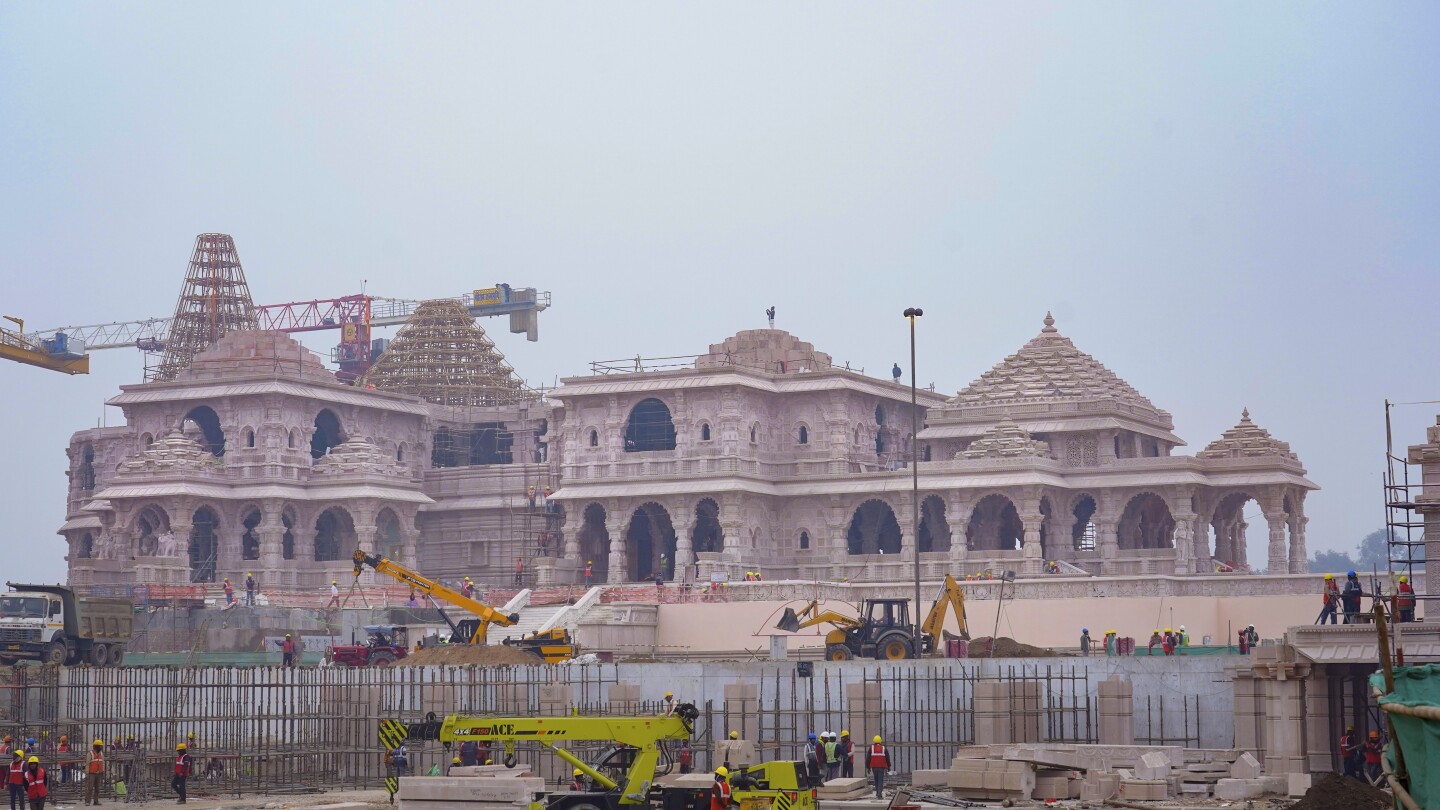Three decades after Hindu mobs tore down a historical mosque, Indian Prime Minister Narendra Modi will attend the consecration of a grand Hindu temple at the same site on Monday in a political move to boost his party ahead of a crucial national vote.
Experts say the temple, dedicated to Hinduism’s most revered deity Lord Ram, will cement Modi’s legacy — enduring but also contentious — as one of India’s most consequential leaders, who has sought to transform the country from a secular democracy into an avowedly Hindu nation.
“Right from the beginning, Modi was driven by marking his permanency in history. He has ensured this with the Ram Temple,” said Nilanjan Mukhopadhyay, an expert in Hindu nationalism and author of a book on Modi.
Many see the temple’s opening as the beginning of the election campaign for Modi, an avowed nationalist who has been widely accused of espousing Hindu supremacy in an officially secular India. Modi’s Hindu nationalist party is expected to once again exploit religion for political gain in the upcoming national elections in April or May and secure power for a third consecutive term.
A correction is required for the unaware. The mosque was built on an ancient temple.
Islam often uses older religious churches/temples for new mosques.
Hagia Sophia In Istanbul is a great example.
_ Hagia Sophia (lit. ‘Holy Wisdom’; Turkish: Ayasofya; Greek: Ἁγία Σοφία, romanized: Hagía Sofía; Latin: Sancta Sapientia), officially the Hagia Sophia Grand Mosque (Turkish: Ayasofya-i Kebir Cami-i Şerifi),[3] is a mosque and a major cultural and historical site in Istanbul, Turkey. The last of three church buildings to be successively erected on the site by the Eastern Roman Empire, it was completed in 537 AD. The site was an Eastern Orthodox church from 360 AD to 1204, when it was converted to a Catholic church following the Fourth Crusade.[4] It was reclaimed in 1261 and remained Eastern Orthodox until the Ottoman conquest of Constantinople in 1453. It served as a mosque until 1935, when it became a museum. In 2020, the site once again became a mosque._
Christ, this asshole.
It’s a constant source of frustration for me that building your political power on promises to elevate a dominant ethnicity or faith over a minority group is such a consistently successful strategy.
And, like … where’s this going? If feels like narratively, rising ethnonationalism never stops itself. It just gets bolder and bolder until something explodes. This feels like the early years of another of history’s ‘oh shit’ moments.
Disagree. Most democracies, even though on paper are secular, always have imprints of the dominant religion. Democracies dominant with Christianity haven’t “exploded”, so why would this ?
First, I just want to say that I don’t agree with your premise (I don’t think Christianity is a common feature of successful democracies), but now importantly, I don’t think your sentiments disagree with anything I said.
I don’t mind if someone’s ideology is shaped by faith. My lament was about ethno/religious supremacy.
My point is, as an example, democracies with dominant religion as Christianity has its religious imprints within the governing body. A simple example to prove this is that all public holidays mostly are serving the dominant religion. (I didn’t say Christianity is a common trait of successful democracies).
Wouldn’t etho/religious supremacy apply here ? Why do you have the lens when you look at a country like India ?
They don’t even need to rigg elections, run beneficial schemes or anything else of that sort, just one or two events like these, a few riots probably, and now you have the majority vote
Christ, this asshole.
It’s actually Rama, this asshole, apparently.
That got a laugh outta me.
My skydaddy can beat up your skydaddy!
-Wisdom of the 21st century
Hinduism’s most revered deity Lord Ram
Never knew they were such fans of Blackadder!
Here is an alternative Piped link(s):
Piped is a privacy-respecting open-source alternative frontend to YouTube.
I’m open-source; check me out at GitHub.
This is the best summary I could come up with:
Experts say the temple, dedicated to Hinduism’s most revered deity Lord Ram, will cement Modi’s legacy — enduring but also contentious — as one of India’s most consequential leaders, who has sought to transform the country from a secular democracy into an avowedly Hindu nation.
Modi’s Hindu nationalist party is expected to once again exploit religion for political gain in the upcoming national elections in April or May and secure power for a third consecutive term.
Made into a national event by the ruling Bharatiya Janata Party, the temple’s opening in Ayodhya — a small city in northern India that has been a historical flashpoint — is expected to resonate deeply with Hindu voters.
In the early 1990s, then a little-known local leader in his native Gujarat state, Modi also helped organize public agitation that aimed to shore up support for the construction of what is now Ram Temple at the former Babri Mosque site.
The dispute ended in 2019 when, in a controversial decision, India’s Supreme Court called the mosque’s destruction “an egregious violation of the rule of law,” but granted the site to Hindus.
Rebuilding the temple at the disputed site has been part of BJP’s election strategy for decades, but it was Modi — rising to power in 2014 on a wave of Hindu revivalism — who finally oversaw that promise after attending its groundbreaking ceremony in 2020.
The original article contains 965 words, the summary contains 231 words. Saved 76%. I’m a bot and I’m open source!








